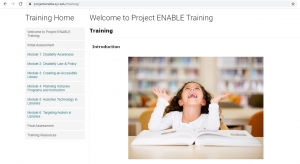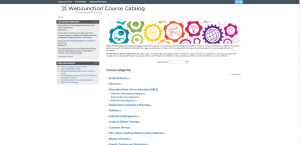I love reading PUBLIB one of the OCLC discussion lists (listservs)[1] that includes more than 9,000 public librarians from around the world with whom you can share your successes, questions and problems. One of the messages that capture my attention was from Dr. Ruth V. Small, ENABLE project Director talking about the project.
ENABLE stands for Expanding Nondiscriminatory Access By Librarians Everywhere, the website is available at: https://projectenable.syr.edu. Since 2012, Project ENABLE, funded in part by a series of grants from the Laura Bush 21st Century Librarian and Laura Bush 21st Century Library Continuation Grants of the Institute for Museum & Library Services and from the School of Information Studies at Syracuse University.
Vision and Goals[2]
Project ENABLE Provides professional development for library professionals from all types of libraries in order to build capacity for providing equitable access and services to students with disabilities, an underserved population. Project ENABLE training is intended to:
- Raising the level of librarians’ understanding of and sensitivity for the library and information needs of students with disabilities and
- Fostering their ability to develop programs and services, provide adequate facilities, and select appropriate resources and technologies to meet those needs.
While this site provides training for all educators who support diverse learners, they focus particularly on the school, public, and academic librarian to reach their goal of equity for all students.
Learning Modules:
Project ENABLE training site offers most comprehensive, totally free, online training site for librarians in the area of libraries and disabilities. It also contains self-paced learning modules, each focused on a major area of content related to library and information services to students with disabilities. Each module includes an introduction, learning objectives, a set of topics, examples, activities, related resources, and a brief self-assessment. The learning modules are:
- Module 1: Disability Awareness
- Module 2: Disability Law & Policy
- Module 3: Creating an Accessible Library
- Module 4: Planning Inclusive Programs and Instruction
- Module five: Assistive Technology in Libraries
- Module 6: Targeting Autism in Libraries
Dr. Ruth mentioned in his message that the website was recently updated and contains the following:
- Interactive challenge videos, featuring real-life librarians who describe how they faced (and overcame) specific accessibility and inclusion challenges.
- Created and published the first issue of PE News, a semi-annual e-newsletter with informative articles written by disabilities experts, professional librarians, and pre-service librarians.
- ENABLE is partnering with Infopeople, the high quality professional development site, to provide a series of free online courses, webinars and discussions related to libraries and disabilities.
- They have created a “Train the Trainer” section of training (to be available in early 2021) that will contain workshop/course outlines and templates, learning support materials, PowerPoints, suggested readings and assessments that everyone can use to create and deliver customized training to their staff, paraprofessionals and/or volunteers.
This is indeed a great initiative that really deserve to be highlighted as it offers all the previous resources for free to all librarians.
[1] https://www.oclc.org/content/forms/worldwide/en/internet-subscription.html

